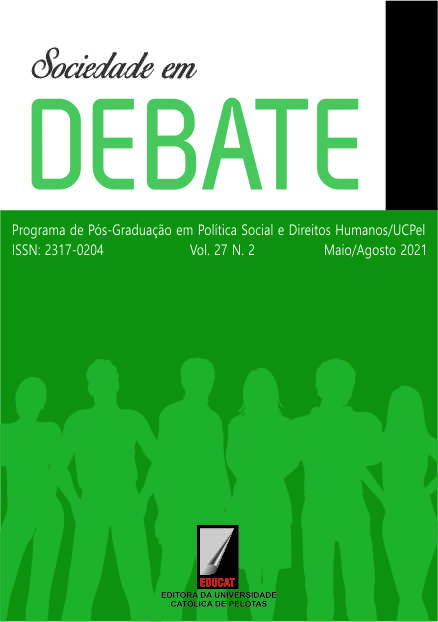High frequency of descending configuration: resilience and family coping strategies
DOI:
https://doi.org/10.47208/sd.v27i2.2883Keywords:
Resiliência, Estratégias de Enfrentamento, Perda Auditiva de Configuração DescendenteAbstract
The purpose of this article is to identify and analyze family resilience and coping strategies for families that have members with hearing loss descending configuration. Hearing loss descending configuration is one of the most common types of hearing loss, and it can affect individuals of different age groups. To achieve the objective of the study, a quantitative-qualitative research was carried out, with a family member, preferably the spouse, of the metalwork and precast workers at the Federal University of Viçosa. For data collection, the participants answered the Family Resilience Assessment Scale (FRAS), the Coping Strategies Inventory (Echelle Toulousaine de Coping - ETC) and an interview based on a semi-structured script. A descriptive analysis of the study variables (mean, standard deviation, minimum and maximum values) was performed with the help of the STATA software, version 14, in addition to the analysis of the interviewees' speech. Although the families reported, in their speech, the interference of BP in communication, they showed satisfactory levels of family resilience, in order to favor the adjustment of the family in the face of hearing loss. Among the coping strategies adopted, the most used was control, which demonstrated, once again, that even with hearing loss, families were able to adapt in their communication process.
Downloads
References
BARALDI, Giovana dos Santos; ALMEIDA, Laís Castro de; BORGES, Alda Cristina de Carvalho. Evolução da perda auditiva no decorrer do envelhecimento. Revista Brasileira de Otorrinolaringologia, v. 73, n. 1, p. 64-70, 2007.
BARBOSA, Hudson Jose Cacau; AGUIAR, Rafaela Arêas; BERNARDES, Hugo Moura Campos; JUNIOR, Romildo Rocha Azevedo; BRAGA, Débora Brizon; SZPILMAN, Ana Rosa Murad. Perfil clínico epidemiológico de pacientes com perda auditiva. Journal of Health & Biological Sciences, v. 6, n. 4, p. 424-430, 2018.
BARKER, Alex Byron, LEIGHTON, Paul; FERGUSON, Melanie A. Coping together with hearing loss: a qualitative meta-synthesis of the psychosocial experiences of people with hearing loss and their communication partners. International Journal of Audiology, v. 56, n. 5, p. 297-305, 2017.
BITTENCOURT, Zélia Zilda Lourenço de Camargo; FRANÇOZO, Maria de Fátima de Campos; MONTEIRO, Claudia Rodrigues; FRANCISCO, Débora Durante. Surdez, redes sociais e proteção social. Ciência & Saúde Coletiva, v.16, n. 1, p.769-776, 2011.
CANTON, Karen; WILLIAMS, Warwick. The Consequences of Noise-Induced Hearing Loss on Dairy Farm Communities in New Zealand. Journal of Agromedicine, v. 17, n. 4, p. 354-363, 2012.
CARMO, Inês Francisco do. Resiliência e Funcionamento familiar na Doença Oncológica: Percepção dos Pacientes. Dissertação de Mestrado. ISMT, Coimbra, 2019.
CERVEIRA, Cátia Machado. Percepção de funcionamento familiar nas diferentes configurações familiares. 2015. Dissertação (Mestrado em Psicologia Clínica), Instituto Superior Miguel Torga, Coimbra, 2015.
CHAMON, Edna Maria Querido de Oliveira. Estresse e estratégias de enfrentamento: o uso da Escala Toulousaine no Brasil. Revista Psicologia Organizações e Trabalho. 6, 2, 43-64, 2006.
COMITÊ NACIONAL DE RUÍDO E CONSERVAÇÃO AUDITIVA. Valorização dos Efeitos Auditivos e não Auditivos em Processos Judiciais Referentes à PAIR Relacionada ao Trabalho. Boletim (5), São Paulo, 1998.
FERNANDES, Fernanda Santos. Diversidade na perda auditiva: conhecer para incluir. Revista Científica Multidisciplinar UNIFLU, 4, 2, 318-336, 2019.
FOLKMAN, Susan; LAZARUS, Richard S. An analysis of coping in a middle-aged community sample. Journal of Health and Social Behavior, v. 21, n. 3, p. 219-239, 1980.
FONTES, Arlete Portela; NERI, Anita Liberalesso. Estratégias de enfrentamento como indicadores de resiliência em idosos: um estudo metodológico. Ciência & Saúde Coletiva, v. 24, n. 4, p. 1265-1276, 2019.
FRANCELIN, Madalena Aparecida Silva; MOTTI, Telma Flores Genaro; MORITA, Ione. As implicações sociais da deficiência auditiva adquirida em adultos. Revista Saúde e Sociedade, v.19, n.1, p.180-192, 2010.
GARBELINI, Adriana dos Santos. Funcionamento familiar como mediador da sobrecarga percebida, qualidade de vida, ansiedade e depressão de cuidadores familiares. Dissertação de Mestrado. Escola de Enfermagem de Ribeirão Preto, Ribeirão Preto, 2014.
GLAT, Rosana. O papel da família na integração do portador de deficiência. Revista Brasileira de Educação Especial, v. 1, n.4, p.111-118, 2009.
GOLDSON, Edward. Disability, family and society: new thinking of an old debate. Ciência & Saúde Coletiva, v. 21, n. 10, p. 3303-3307, 2016.
GOMEZ, Rowena G; MADEY, Scott F. Coping-with-hearing-loss model for older adults. Journal of Gerontology: Psychological Sciences, v. 56, n. 4, p. 223-235, 2001.
GONÇALVES, Cláudia Giglio de Oliveira; FONTOURA, Francisca Pinheiro. Intervenções educativas voltadas à prevenção de perda auditiva no trabalho: uma revisão integrativa. Revista Brasileira de Saúde Ocupacional, v. 43, n. 1, p. 1-13, 2018.
HALLBERG, Lillemor R-M.; BARRENÄS, Marie-Louise. Living with a male with noise-induced hearing loss: Experiences from the perspective of spouses, British Journal of Audiology, v. 27, n. 4, p. 255-261, 1993.
HALLBERG, Lillemor R-M.; ERLANDSSON, Soly I.; CARLSSON, Sven G. Coping strategies used by middle-aged males with noise-induced hearing loss, with and without tinnitus. Psychology & Health, v. 7, n. 4, p. 273-288, 2007.
HÉTU, Raymond; JONES, Lesley; GETTY, Louise. The Impact of Acquired Hearing Impairment on Intimate Relationships: Implications for Rehabilitation, Audiology, v. 32, n. 6, p. 363-380, 1993.
HOLLING, Crawford Stanley. Resilience and Stability of Ecological Systems. Annual Review of Ecology and Systematics, v. 4, p. 1-23, 1973.
KNUTSON, John F.; LANSING, Charissa R. The Relationship between Communication Problems and Psychological Difficulties in Persons with Profound Acquired Hearing Loss. Journal of Speech Language and Hearing Research, v. 55, p. 656-664, 1990.
LOPES FILHO, Otacílio. Deficiência Auditiva. In: Lopes Filho, Otacílio (Ed.). Novo Tratado de Fonoaudiologia. (Ed. 3, pp.23-39). Ribeirão Preto: Ed. Manole, 2013.
McCUBBIN, H.I., MARILYN, A.W.M., McCUBBIN, A.; THOMPSON, A.I. Resiliency in families: The role of family schema and appraisal in family adaptation to crisis. In Brubaker, T.H. (Ed.). Family relations: Challenges for the future, p.123-142. Beverly Hills: Sage, 1993.
McLEAN, Will. Toward a true cure for hearing impairment. Science, v. 359, 2018.
MESSA, Alcione Aparecida; FIAMENGHI JR, Geraldo Antônio. O impacto da deficiência nos irmãos: histórias de vida. Ciência & Saúde Coletiva, v. 15, n. 2, p. 529-538, 2010.
NUNES, O.; BRITES, R.; PIRES, M.; HIPÓLITO, J. Escala Toulousiana de Coping-Reduzida. Manual Técnico De Utilização. Centro de Investigação em Psicologia - Universidade Autónoma de Lisboa, 2014.
PRADO e SILVA, Lucilene; VANDENBERGHE, Luc. A importância do treino de comunicação na terapia comportamental de casal. Psicologia em Estudo, v. 13, n. 1, p. 161-168, 2008.
MALMBERG, Milijana; THORÉN, Elisabet Sundewall; ÖBERG, Marie; LUNNER, Thomas; ANDERSSON, Gerhard; KÄHÄRI, Kim. Experiences of an Internet-based aural rehabilitation (IAR) program for hearing aid users: a qualitative study, International Journal of Audiology, v. 57, n. 8, p. 570-576, 2018.
PREMINGER, Jill; MEEKS, Suzanne. The influence of mood on the perception of hearing-loss related quality of life in people with hearing loss and their significant others. International Journal of Audiology, v. 49, n. 4, p. 263-271, 2010.
RAMIRES, Cristhiene Montone Nunes; BRANCO-BARREIRO, Fátima Cristina Alves; PELUSO, Érica Toledo Piza. Fatores relacionados à qualidade de vida de pais de crianças com deficiência auditiva. Ciência & Saúde Coletiva, v. 21, n. 10, p. 3245-3252, 2016.
SAMELLI, Alessandra Giannella; NEGRETTI, Camila Aparecida; UEDA, Kerli Saori; MOREIRA, Renata Rodrigues. Comparing audiological evaluation and screening: a study on presbycusis. Brazilian Journal of Otorhinolaryngology, v.77, n.1, p.70-76, 2011.
SAVÓIA, Mariangela Gentil. Escala de eventos vitais e de estratégias de enfrentamento (coping). Revista de Psiquiatria Clínica, v. 26, n. 2, p. 56-67, 1999.
SIXBEY, Meggen Tucker. Development of the family resilience assessment scale to identity family resilience constructs. Dissertation (Doctor of Philosophy) - Graduate School, University of Florida, 2005.
TABOADA, Nina G.; LEGAL, Eduardo José.; MACHADO, Nivaldo. Resiliência: em busca de um conceito. Revista Brasileira de Crescimento e Desenvolvimento Humano, 16, 3, 104-113, 2006.
TURKENICZ, Abraham. Organizações familiares: contextualização histórica da família ocidental. Curitiba: Juruá, 2012.
VERAS, Renato Peixoto; MATTOS, Leila Couto. Audiologia do envelhecimento: revisão da literatura e perspectivas atuais. Revista Brasileira de Otorrinolaringologia. 73, 1, 128-134, 2007.
WALSH, Froma. Fortalecendo a resiliência familiar. São Paulo: Roca, 2005.
WERNER, Emmy E.; SMITH, Ruth S. Overcoming the odds: highrisk children from birth to adulthood. London: Cornell University Press, 1992.
YORGASON, Jeremy B.; PIERCY, Fred P.; PIERCY, Susan K. Acquired hearing impairment in older couple relationships: an exploration of couple resilience processes. Journal of Aging Studies. 21, 3, 215-228, 2007.
Downloads
Published
How to Cite
Issue
Section
License
Copyright (c) 2021 Lenilda Viana Viana, Karla Maria Damiano Teixeira

This work is licensed under a Creative Commons Attribution-NonCommercial 4.0 International License.



